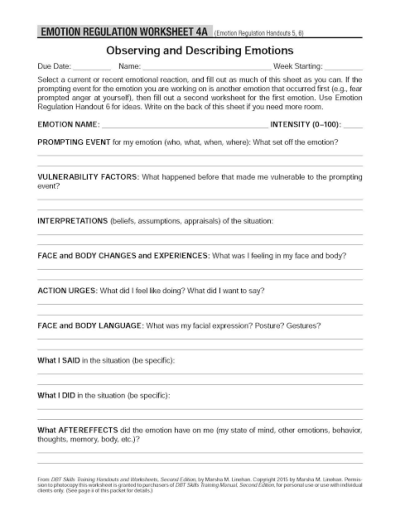Dialectical Behavior Therapy (DBT) focuses on teaching people strategies to help them live their best and most productive life. DBT is often used to help people with depression, anxiety, borderline personality disorders, addictions, eating disorder, and PTSD.

There are four core skill sets that you master to help you problem solve and deal with issues:
Myth: It works better than anything else. Fact: Perhaps it “works” more quickly or easily than anything else you’ve tried, but that doesn’t mean it’s worth damaging your relationship with your dog, and potentially encouraging severe aggression and behavior issues, because it’s faster than real training. Myth: I saw immediate results. Myth 2: ABA is only for high functioning children. ABA has been very effective in the treatment of lower functioning children with ASD. Myth 3: ABA is only for low functioning children. ABA has been effectively used to address academic delays as well as behavior problems across all functioning levels. Rational emotive behavioral therapy (REBT) is a form of therapy that can be very effective in helping clients. It offers a means to gain perspective on challenging situations. REBT suggests that the way people understand situations causes them to be reactive. The concept of REBT implies that a situation is neither positive nor negative. Behavior-based safety is a broad term used to describe everything from basic employee behavior audits and feedback to a comprehensive safety management system designed to change a company’s safety culture. By: Sandy Smith EHS Today When it was introduced, behavior-based safety (BBS) was seen as a magic panacea for. While completing dialectical behavior therapy (DBT), I came across a worksheet that really made me challenge the beliefs I had about my emotions (Emotion Regulation Worksheet 3 from the book “DBT Skills Training Handouts and Worksheets, Second Edition”). The creator of DBT, Marsha M. Linehan, presents myths about our emotions and instructs.

What Is Dialectical Behavioral Therapy
- Mindfulness - the core skill in DBT is being able to non-judgmentally observe yourself and your surroundings. You will become more aware of the physical and mental triggers that cause runaway emotions.
- Distress Tolerance - deal with painful situations. When you can't change the situation, learn how to tolerate it, accept it, and move forward.
- Emotion Regulation - learning to make your emotions work for you. Learn to recognize when an emotion is unproductive and change it into a more productive emotion.
- Interpersonal Skills - change the way you communicate so you get more out of your relationships. Learn to communicate what you want. Become comfortable saying no.
